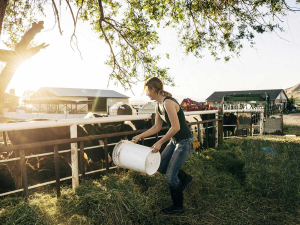NZ Catchment Groups Thrive with ‘Source to Sea’ Approach
The most successful catchment groups in NZ are those that have 'a source to sea' approach.
 The programme is designed to promote mental health and wellbeing to first year agricultural students, many of whom fall within the young adult category.
The programme is designed to promote mental health and wellbeing to first year agricultural students, many of whom fall within the young adult category.
Research into the impacts of the inaugural rollout of the WellMates programme at Massey University has shown promising results and outlined ways to strengthen its delivery, the university says.
WellMates, a mental health and resilience programme developed by Lincoln University, is being run for a second year at Massey after researchers found it significantly benefitted participants.
The programme is designed to promote mental health and wellbeing to first year agricultural students, many of whom fall within the young adult category.
While recent studies have shown farmers are prone to experiencing burnout, young people aged 17-24 are particularly vulnerable within this community.
The group is often underrepresented in mental health promotion strategies despite making up approximately 25% of farmer suicides.
School of Social Work Senior Lecturer Dr Nicky Stanley-Clarke, who played a pivotal role in bringing the programme over to Massey, has been among the researchers studying what effect WellMates is having.
She says the research shows WellMates is having a positive effect in increasing awareness and building upon existing knowledge of mental health.
“We conducted surveys on participating agricultural students before and after engaging in the programme, as well as a control group of agricultural students in the same year who didn’t attend. Students who participated in WellMates showed greater mental health and wellbeing knowledge than students who didn’t,” says Stanley-Clarke. “WellMates helped them build their skills and improve their confidence in advocating for themselves and others.”
A second round of funding from Massey Lincoln Agriculture Industry Fund (MLAIF) (formerly known as Massey – Lincoln and Agricultural Industry Trust) has provided the opportunity for WellMates to also be offered online this year.
“We’ve worked with the learning designers here at Massey to translate the content from in-person courses into a module embedded within a learning platform such as Stream,” says Stanley-Clarke. “The team has been fantastic at ensuring it’s engaging for our distance cohort by including pop-ups, videos and scenarios. Our Young Farmers facilitators have recorded voiceovers to guide people through the module.”
“Mark Rainier from the Student Services team has supported the delivery by peer reviewing the online module and ensuring the appropriate resources are immediately available, including Massey’s wellbeing and counselling services and TalkCampus.”
Stanley-Clarke says an interesting trend that appeared in the pre-programme survey was the number of students who presented with optimism bias.
She says many students tend to underestimate the possibility of experiencing stressful situations, believing those scenarios are unlikely to happen to them or will resolve without the need for support services.
“We learnt from our research that peer-to-peer connection was found to be really important and can help undo this type of thinking.”
WellMates was initially run as a two-hour conversation lead by Lincoln students who flew up to deliver the programme. Dr Stanley-Clarke says this year they’re partnering with Massey’s Young Farmers Club to improve connection and combat optimism bias.
“Members of the club have volunteered to be facilitators and deliver the programme. Students will get to hear from people like them about how important it is to take steps to manage your wellbeing and to know how to access support which helps break down stigma, particularly around the ‘tough farmer’ ideal. When you see others like you having that conversation, you’re more likely to join in and be engaged.”
Other changes to be implemented in the programme include reconsidering the timing of the programme within the semester and ensuring it’s embedded into the course.
“It’s important to be strategic with timing to ensure students are open and receptive to the messages,” Stanley-Clarke says. “It can’t be in the middle of exams or right before semester break when assignments are due.”
She says researchers also found it is vital students view this course as important and that it’s sold by lecturers as such because otherwise when students get busy, they’ll make the decision to skip it, thinking it won’t affect them.
“Getting people in the room so they can engage with the messaging is important, so having it as part of the course with an assessment or participation grade attached can be good motivation,” she says.
Budou are being picked now in Bridge Pā, the most intense and exciting time of the year for the Greencollar team – and the harvest of the finest eating grapes is weeks earlier than expected.
The Real Estate Institute of New Zealand (REINZ) has released its latest rural property report, providing a detailed view of New Zealand’s rural real estate market for the 12 months ending December 2025.
Rural retailer Farmlands has released it's latest round of half-year results, labeling it as evidence that its five-year strategy is delivering on financial performance and better value for members.
OPINION: "We are back to where we were a year ago," according to a leading banking analyst in the UK, referring to US president Donald Trump's latest imposition of a global 10% tariff on all exports into the US.
DairyNZ says the Government’s proposed Resource Management Act reform needs further work to ensure it delivers on its intent.
Overseas Trade Minister Todd McClay says he's working constructively with the Labour Party in the hope they will endorse the free trade agreement (FTA) with India when the agreement comes before Parliament for ratification.

OPINION: A mate of yours truly reckons rural Manawatu families are the latest to suffer under what he calls the…
OPINION: If old Winston Peters thinks building trade relations with new nations, such as India, isn't a necessary investment in…